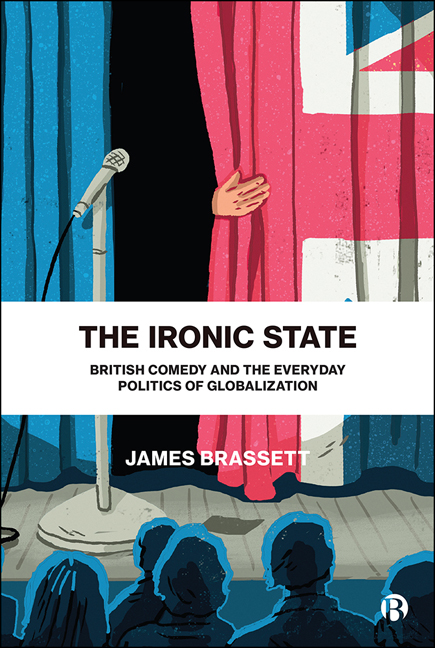Book contents
- Frontmatter
- Contents
- Acknowledgements
- Introduction: Comedy and the Politics of (Global) Resistance
- 1 Everyday Comic Resistance in Global Context
- 2 The Satire Boom: Imperial Decline and the Rise of the Everyday Elite
- 3 Alternative Comedy and Resistance to ‘Thatcher’s Britain’
- 4 Irony and the Liminality of Resistance
- 5 Austerity and the Rise of Radical Comedy
- 6 Brexit, or How I Learned to Stop Worrying and Love the Single Market
- 7 The Globalization of Comic Resistance?
- Bibliography
- Index
5 - Austerity and the Rise of Radical Comedy
Published online by Cambridge University Press: 04 January 2022
- Frontmatter
- Contents
- Acknowledgements
- Introduction: Comedy and the Politics of (Global) Resistance
- 1 Everyday Comic Resistance in Global Context
- 2 The Satire Boom: Imperial Decline and the Rise of the Everyday Elite
- 3 Alternative Comedy and Resistance to ‘Thatcher’s Britain’
- 4 Irony and the Liminality of Resistance
- 5 Austerity and the Rise of Radical Comedy
- 6 Brexit, or How I Learned to Stop Worrying and Love the Single Market
- 7 The Globalization of Comic Resistance?
- Bibliography
- Index
Summary
Introduction
British comedy took an essentially ambiguous turn through the 1990s and into the early 21st century. The complex layers of ironic meaning, critical distance, and reflexivity in relation to ‘our’ situation within global power relations served distinct functions. In the hands of satirists like Chris Morris, there was a subversive and potentially radical message: the mediatized form of global politics had prioritized spectacle, personality and soundbite. Yet, the popularity of ironic resistance, especially as it was developed by Sacha Baron Cohen and Ricky Gervais, created a moral dilemma: how far could – or should – irony go with questions of identity? A relentless focus on race, gender, disability and so on, might perform as reactionary when circulated for applause. As Stewart Lee (in Kovesi, 2012) reflected:
‘in the 80s when alternative comedy started, one of the things that it was supposed to do was not be sexist, not make fun of people who were differently abled, not do racist stuff … […] A lot of it has crept back in under the idea that there's “irony”; that the comedian is holding up a mirror to society, showing us our prejudices by enacting them for money.’
This is a clear ethical limit for irony. While Gervais may be capable of articulating the distinction between the ‘subject of social violence’ and ‘the joke he is making about that violence’, it is unclear whether this nuance is always operative with the audience. As such, Chapter 4 made a qualified argument that the liminality of ironic resistance worked to foreground questions of responsibility. Although some jokes may be subversive, for example Gervais’ satire of global charity campaigns, similarly ironic jokes can perform a moment of exclusion – Little Britain for example. Indeed, the next chapter will question how the (re-)emergence of right-wing and reactionary comedy has begun to explore ironic themes, albeit from a libertarian position on free speech. However, for now, this chapter will explore a more radical turn in British comedy associated with the work of comedians like Charlie Brooker, Russell Brand and Stewart Lee.
While aspects of the radical turn can be understood as a ‘push back’ against the exclusionary possibilities of irony, not least Stewart Lee's (2009) defence of political correctness, it is also important to recognize and situate radical comedy within the everyday experience of global crisis.
- Type
- Chapter
- Information
- The Ironic StateBritish Comedy and the Everyday Politics of Globalization, pp. 97 - 118Publisher: Bristol University PressPrint publication year: 2021



